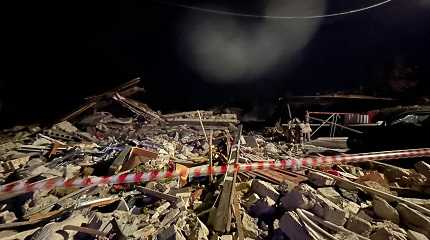
BUCHAREST, Romania (AP) — Romanian authorities said Thursday they found a crater from a suspected drone that may have exploded on impact on its territory near the border with Ukraine, reviving concerns about possible spillover of Russia’s war in Ukraine onto a NATO member country.
The pre-dawn discovery of the crater three kilometers (1.8 miles) west of the village of Plauru, which sits across the Danube River from the Ukrainian port of Izmail, was made after the Romanian Defense Ministry said it detected a series of drones heading towards Ukrainian river ports.
The ministry said the drone had possibly exploded on impact but it was not immediately clear when or from where the drone was launched. An investigation was under way.
“Heinous Russian attacks on Ukraine’s civilian infrastructure had again serious consequences on Romania’s territory,” Foreign Minister Luminita Odobescu wrote on X, the social medial platform formerly known as Twitter, adding that “new evidence of impact was found on Romania’s soil.”
“We call on Russia to stop these war crimes,” she said.
Romanian authorities have previously confirmed drone fragments on its soil in recent weeks, and said the parts resembled those from drones used by the Russian army.
NATO Secretary-General Jens Stoltenberg said Wednesday that the alliance has increased the number of aircraft monitoring Romania’s skies after the drone findings, but added there is no proof of an “intentional attack” on the NATO member.
“But rest assured, we have capabilities, different types of capabilities, to closely monitor and also to help protect all NATO Allies, including Romania,” he said.
Romanian President Klaus Iohannis called the drone fragment discoveries “an absolutely unacceptable violation of the sovereign airspace of Romania, a NATO ally, with real risks to the security of Romanian citizens in the area.”
The recurring incidents over the past month have left some residents living near the border nervous that the war could spill into their country, and the village of Plauru erected prefabricated concrete shelters for residents last month.
Separately Thursday, the governor of Russia’s Belgorod region on the border with Ukraine said three people, including a child, were killed and two others injured overnight after drone debris fell on a private house, setting it on fire.
The drone was shot down by air defense systems but the debris “effectively destroyed” two private houses on the outskirts of the city of Belgorod, the region’s capital, and damaged several more, said Belgorod Gov. Vyacheslav Gladkov.
The Belgorod region has been a regular target of cross-border shelling and drone attacks. Ukrainian officials have never acknowledged responsibility for attacks on Russian territory.
In Ukraine, the office of President Volodymyr Zelenskyy said at least ten civilians were killed and 18 people were injured over the past 24 hours, including from a missile strike on the southern city of Nikopol that hit a school, killing four and injuring two. A total of 50 homes, infrastructure facilities and power lines were damaged in the city on the Dnipro River.
Ukraine’s air force said it intercepted 28 of 33 Shaheed drones that Russia launched overnight across the country. Gov. Oleh Kiper of the southern Odesa region — in which Izmail is located — said Russian forces had targeted Danube port infrastructure in the region, wounding one person.
In recent weeks, Russia has carried out sustained attacks on Ukraine’s Danube ports as part of Moscow’s attempt to disrupt Ukraine’s ability to export grain to world markets.
In the eastern Donetsk region, intense and incessant fighting continued near the city of Avdiivka, said Vitalii Barabash, the head of city’s military administration.
“A very tense situation for the third day. The battles around the city do not cease, and the shelling, both at positions and within the city itself, does not stop,” Barabash said on Ukrainian television.
President Volodymyr Zelenskyy posted on Telegram that “we are holding our ground” in the city. A day earlier, the Ukrainian leader joined a meeting of more than 50 defense leaders from around the world and made a personal pitch for more military aid for his country in the face of the Russian onslaught.
The Czech Republic and Denmark on Thursday pledged to send Ukraine more Western weapons. The Czech Foreign Ministry said the package, to be sent in coming months, will include 50 infantry fighting vehicles and battle tanks, 500 heavy machine guns, 280 self-propelled howitzers, 7,000 anti-tank weapons, 60 mortar systems as well as anti-drone systems.
In its latest report, Washington-based think tank Institute for the Study of War said Russian offensive action near Avdiivka is ongoing. Footage from Tuesday and Wednesday showed Russian troops advancing in areas southwest and northwest of the town.
The think tank said such “tactical-level adaptations and successes” by Russian forces were not likely to bring wider operational and strategic gains.
“Avdiivka is also a notoriously well-fortified and defended Ukrainian stronghold, which will likely complicate Russian forces’ ability to closely approach or fully capture the settlement,” it added.
The Interior Ministry said the death toll from last week’s missile attack that leveled a cafe in the village of Hroza, in northern Kharkiv region, has risen to 59, following the identification of more victims.
The Hroza attack is one of the deadliest strikes by Russian troops in Ukraine since the invasion in February last year. Numerous bodies were found torn to pieces and it took nearly a week identify those who were killed when the Russian Iskander missile slammed into the cafe.




